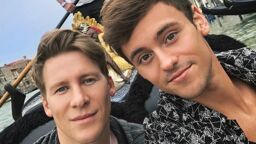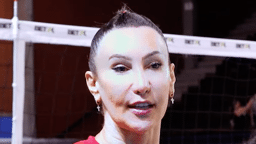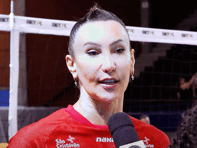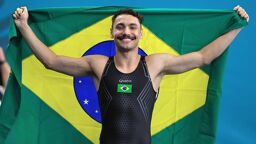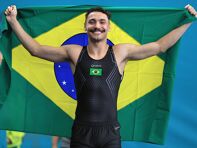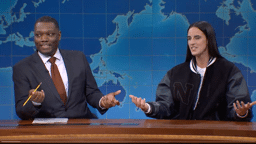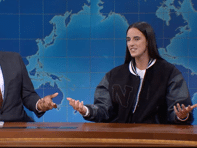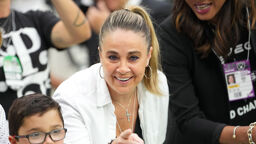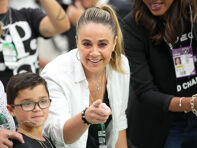Keith Carney chases his dream of being an Olympian
 Keith Carney is a long track speedskater who is training with his goal to compete in the 2010 Olympics. At the U.S. Championships in December he set a personal record and finished 10th in the men’s 5,000 meters. He is also openly gay and wrote about his experiences for Outsports.
Keith Carney is a long track speedskater who is training with his goal to compete in the 2010 Olympics. At the U.S. Championships in December he set a personal record and finished 10th in the men’s 5,000 meters. He is also openly gay and wrote about his experiences for Outsports.
By Keith Carney
For Outsports.com
I came out during graduate school at the University of Alaska Fairbanks, graduated two years later, worked the perfect job then decided to pursue my dream of becoming a long track speedskater.
This was soon after the 2002 Salt Lake City Olympics, and the new mecca of long track speedskating in the U.S. was the Utah Olympic Oval in Salt Lake City. I soon made the decision to commit to the sport, however irrational those around thought it was, and on July 5, 2003, at the age of 28, I arrived. Looking back it was the best decision I ever made.
 |
| Carney in his specialty, the 5,000 meters |
Fairbanks, Alaska, didn’t have much of a gay community, but coming out was the hardest thing I had ever done, and I promised myself it was something I would never hide again. I did not know much about the Mormon religion, but quickly learned the environment after moving to Salt Lake City. Growing up in a strict Catholic family I was experienced with people who live their lives blindly following religious doctrine, but the LDS church was something I hadn’t encountered before.
Staff at the Utah Olympic Oval, based on my ability, recommended I start in the STEP 3 program. My first speedskating coach in the STEP 3 program was eight years younger than me, and was head of the team for the next five months. Then the coach position was taken over by 1998 Olympian Cory Carpenter who remained my coach for the next 2 1/2 seasons. For the both coaches, my being gay was brought out in the open in the same way: One night after practice we walked out to our cars at the same time, and engaged in small talk. They asked me if I had a girlfriend, and without hesitation I said, “No, I’m gay actually”, and they quickly responded, “Oh, well I’m glad you were upfront about that with me,” and we went back to discussing other things.
The STEP 3 team was mainly made up of people 15 to 40 who knew how to speedskate, but were at a relative intermediate level. About three people in the group, including myself, were very dedicated and hard working, with a goal to move up to the High Performance program. I got along with everyone on the team, and eventually everyone, through various conversational avenues, found out I was gay, and treated it mostly as a non-issue.
Cool with sexuality
During my three seasons on this team I saw my share of people join the team, say they were going to go to the Olympics, and then after several months of training you never say them again. Most of them were cool people, and somewhere along the way in conversations with them they would discover I was gay and they had no problem with it, and were usually pretty curious and had lots questions.
There were two occasions when people, who were teammates, told me to my face that they thought homosexuality was wrong. These people happened to be Mormon, and they never asked me any questions. I found this reaction shocking since my own coming out, despite me being fearful, actually turned out great; my friends were very supportive. So I was actually more fascinated by the reaction since I had yet to be confronted by someone who saw me as an abomination.
These teammates who reacted in a negative way eventually, during the course of a year or more, learned more about me, and came to understand that being gay was part of who I am and something I could not change.
Around the same time I also had a female Mormon friend at my job, who I realized had a crush on me. We were great friends, but I when I realized her interest in me I was quick to bring up I was gay. She soon became more open about how she felt about me, but never asked me any questions. And on several occasions she did, despite saying she “accepted” me being gay, told me I should still just try to date girls. To me this reaction had absolutely no logic to it, and I grew distant with her.
My final season with the STEP 3 program was 2006, which happened to be an Olympic year. At the beginning of the season I skated a qualifying time in the 5,000 meters that allowed me to compete in the Olympic trials. I placed last or nearly last in all the events I skated, but it was my first major national competition, and I set personal records in all my races. During that season I learned that one of the current national team coaches was a gay man, and was rather inspired to find out he was also a former Olympian.
At the elite level
The following season I applied for acceptance onto the FAST team (high performance speedskating). The FAST program is a speedskating team run by the Utah Olympic Oval, and comprised of national team athletes who choose not to train with the national team, and well as Category 1 and Category 2 athletes.
I was accepted onto the team, and my upcoming season on was a huge struggle. Being gay, though, did not have a negative effect. Being around the elite athletes on the team, I never felt put down or rejected because of being gay. There was the occasional, “that’s gay” comment, but I was always quick to follow it up with a straight-faced, “What did you say?” to which the reply was typically, “Oh sorry, I didn’t mean to say that,” to which I would smile and we’d both laugh it off.
Midway through my first season on the FAST team, our coach left for another job with U.S. Speedskating, and he was replaced by my current coach, Michael Kooreman. Mike is by far one of the most open-minded and tolerant people I have met. And his interest is only in making me into the best athlete I can be.
This has also been the attitude of national team coaches and national team athletes with their positive reinforcement, and constructive criticism on my skating. My teammates, although having an overall “nervous tolerance” when I first joined the team, have become increasing inclusive of talking to me about my personal life in the same way they would listen or hear about a straight friend’s issues with his or her girlfriend and boyfriend.
I recently achieved a 10th place finish in the 5,000 meters at the U.S. National Championships, and after my race I received a sincere congratulations from my teammates, friends, and the parents of the younger athletes who I have gotten to know well during my past five seasons training as a long track speedskater.
Before I moved to Salt Lake City, I remember reading an article on gay.com and later in more detail on Outsports about an openly gay snowboarder named Ryan Miller. Ryan was an elite snowboarder and hoped to make the 2002, and 2006 Olympic team, and become an openly gay Olympic athlete. Unfortunately, Ryan did not make the team.
I know that if I had known of an openly gay elite athlete when I was younger it would have had a huge impact on me when I was growing up. After all there are plenty of straight role models to choose from when you’re a kid, but I can’t think of any gay role models that I wanted to follow. So as I train towards 2010, I feel a similar pressure that Ryan Miller felt: to break gay stereotypes, and reinforce the fact that a person’s potential for being an Olympic athlete, or any kind of elite athlete has nothing to do with your sexual orientation.
Keith has a website and is seeking sponsors.











